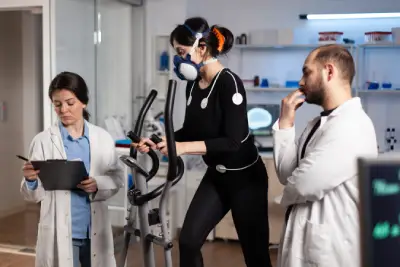

How do we define evidence based practice? In terms of what we do at The Physiotherapists it simply means using methods for our assessments and treatments that have been proven in a robust and scientific way. It also means continuously checking that that evidence has not changed and challenging preconceived beliefs and bias.
What is Evidence-Based Practice (EBP)?
Evidence based practice or EBP means making healthcare decisions based on the most reliable and up-to-date evidence available. It’s about combining our physiotherapy expertise with the latest scientific research. Physiotherapy can be a long career and what was once considered a good practice can, over time change due to new evidence.
The chartered society of physiotherapists (CSP) recommend that all it’s members continuously strive to keep their knowledge up to date. In fact it’s a requirement of both the CSP and the Health and Care Professionals Council (HCPC) that physiotherapists keep a record of their continued professional development.
Why Does Evidence-Based Practice Matter?
Here’s why EBP is essential:
- Better Care: EBP ensures you receive high-quality care that’s proven to work. This leads to improved outcomes and greater satisfaction. It also reduces any risk of complications from practices that don’t work or are unsafe.
- Efficiency: By discounting techniques or information that is disproven we keep your treatment as effective as possible. less trial and error means, quicker results. Quicker results means fewer appointments healthcare is cost-effective.
- Advancing Our Field: EBP keeps us at the forefront of physiotherapy.
- Educational Excellence: Our commitment to EBP means our team are always innovating.
Understanding Evidence:
Think of evidence as the solid foundation upon which we build your treatment plan. If a technique can be robustly proven, then you have piece of mind that it’s more likely to work.
Where Does Evidence Come From?
We gather evidence from:
- Reputable Sources: We rely on trusted journals and publications, reviewed by experts, to inform our practice. Things like the British Medical journal that contain peer reviewed research. That means it’s tested analysed by the people that want to use it. We are always careful to discount ‘evidence’ that has been commissioned by private companies.
- Specialised Resources: In addition to traditional sources, we explore government reports and non-commercial studies to ensure we have all the facts.
- Research Databases: Our access to extensive research databases allows us to quickly find the most relevant studies.
Assessing Evidence Quality:
We don’t just find evidence; we evaluate its quality to make sure it’s reliable:
Thorough Examination: We use tools and checklists to carefully assess evidence and ensure it meets the highest research standards.
Guarding Against Bias: We look out for any potential biases in the research, ensuring that our recommendations are impartial and based on solid science.
Trust and Reliability: By only using peer reviewed reputable resources, we know that we are using scientifically proven and trustworthy information.
By the very nature of Physiotherapy it can be difficult to collect data. (Imagine getting 20 people in a room with a broken left leg, with a similar background and getting them all to do the same thing for 6 weeks!?) That’s why we continually look for the latest information so we stay current, relevant and above all else, safe.
At The Physiotherapists, our commitment to EBP means you’re in the best hands possible. Above all we value your well-being and believe in delivering care that’s not only effective but also ethical and inline with the Chartered Society of Physiotherapists code of conduct. Your health journey is important to us, and with EBP, we’re here to make it as successful as possible.
You can read more on how online Physiotherapy is actively delivering positive results
